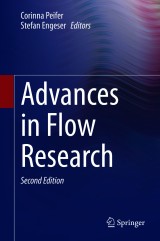Details

Advances in Flow Research
2nd ed. 2021
|
139,09 € |
|
| Verlag: | Springer |
| Format: | |
| Veröffentl.: | 21.01.2021 |
| ISBN/EAN: | 9783030534684 |
| Sprache: | englisch |
Dieses eBook enthält ein Wasserzeichen.
Beschreibungen
<div>This second edition provides a review of the current flow research. The first, thoroughly revised and extended, part of the book, addresses basic concepts, correlates, conditions and consequences of flow experience. This includes the developments of the flow model, methods to measure flow, its physiological correlates, personality factors involved in the emergence of flow, social flow, the relationship of flow with performance and wellbeing, but also possible negative consequences of flow. The second, completely new, part of the book addresses flow in diverse contexts, in particular, work, development, sports, music and arts, and human computer interaction. As such, the book provides a broad overview on the current state of flow research – from the basics to specific contexts of application. It presents what has been learned since the beginning of flow research, what is still open, and how the mission to understand and foster flow should continue. The book addresses researchers and students who are interested in flow, as well as practitioners who seek for sound research on flow in their field of expertise.<br></div>
<div>1. Historical Lines and an Overview of Current Research on Flow.- 2. On the Conceptualization and Measurement of Flow.- 3. Antecedents, Boundary Conditions and Consequences of Flow.- 4. Flow in Nonachievement Situations.- 5. Flow Theory and Cognitive Evaluation Theory: Two Sides of the Same Coin?.- 6. On the Relationship Between Flow and Enjoyment.- 7. The Dark Side of the Moon.- 8. The Psychophysiology of Flow Experience.- 9. Autotelic Personality.- 10. Social Flow.- 11. Flow in the Context of Work.- 12. Flow Experience in Human Development: Understanding Optimal Functioning Along the Lifespan.- 13. Flow in Sports and Exercise: A Historical Overview.- 14. Flow in Music and Arts.- 15. Flowing Technologies: The Role of Flow and Related Constructs</div><div>in Human-Computer Interaction.- 16. Theoretical Integration and Future Lines of Flow Research.</div><div><div><br></div></div><div><div><br></div><div><br></div></div><div><br></div><div><br></div><div><br></div><div><br></div>
<div><div>Corinna Peifer, PhD, is Professor for Work and Organizational Psychology at the University of Lübeck, Germany. Her research is located at the interface between Work- and Organizational Psychology and Psychophysiology, and she is particularly interested in how flow relates to stress and wellbeing. Corinna Peifer is founding member of the European Flow-Researchers’ Network (EFRN), Country Representative Germany for the European Network for Positive Psychology (ENPP) and Vice-President of the German Association of Positive Psychology Research (DGPPF).</div><div> </div><div>Stefan Engeser, PhD, teaches psychology at the University of Trier. He also works as a trained clinical psychotherapist. His research focuses on learning and achievement motivation and individual differences in motive strength. As part of his research on motivation he is particularly interested in flow in achievement contexts and in daily life. He has done research on flow for about 20 years after his interest in flow started as a PhD student of Falko Rheinberg (who was the first researcher on flow in Germany). His practical interest refers to motivational aspects in behavioral therapy with flow representing an important source of motivation.</div></div><div><br></div><div><br></div>
<div>This second edition provides a review of the current flow research. The first, thoroughly revised and extended, part of the book, addresses basic concepts, correlates, conditions and consequences of flow experience. This includes the developments of the flow model, methods to measure flow, its physiological correlates, personality factors involved in the emergence of flow, social flow, the relationship of flow with performance and wellbeing, but also possible negative consequences of flow. The second, completely new, part of the book addresses flow in diverse contexts, in particular, work, development, sports, music and arts, and human computer interaction. As such, the book provides a broad overview on the current state of flow research – from the basics to specific contexts of application. It presents what has been learned since the beginning of flow research, what is still open, and how the mission to understand and foster flow should continue. The book addresses researchers and students who are interested in flow, as well as practitioners who seek for sound research on flow in their field of expertise.</div>
Provides a broad and systematic overview of flow-research Provides a theoretical and empirical integration of the state of the art by means of comprehensive reviews instead of advertising own research views Looks at flow from different perspectives – even from its negative aspects
Diese Produkte könnten Sie auch interessieren:

Alcohol Problems in Adolescents and Young Adults

von: D. Lagressa, G.M. Boyd, Marc Galanter, V.B. Faden, E. Witt

213,99 €

Development of Emotions and Emotion Regulation

von: Manfred Holodynski, Wolfgang Friedlmeier

96,29 €














